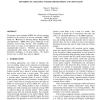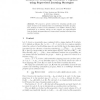23 search results - page 2 / 5 » Scenario Reduction Techniques in Stochastic Programming |
CPE
1994
Springer
13 years 9 months ago
1994
Springer
When implementingparallel programs forparallel computer systems the performancescalability of these programs should be tested and analyzed on different computer configurations and...
WSC
2007
13 years 7 months ago
2007
The Logistics Composite Model (LCOM) is a stochastic, discrete-event simulation that relies on probabilities and random number generators to model scenarios in a maintenance unit ...
WSC
1998
13 years 6 months ago
1998
We present a new technique (RIIPS) for solving rostering problems in the presence of service uncertainty. RIIPS stands for "Rostering by Iterating Integer Programming and Sim...
ICPADS
1994
IEEE
13 years 9 months ago
1994
IEEE
Testingthe performance scalabilityof parallelprograms can be a time consuming task, involving many performance runs for different computer configurations, processor numbers, and p...
SAGA
2009
Springer
13 years 11 months ago
2009
Springer
We propose a generic method for obtaining quickly good upper bounds on the minimal value of a multistage stochastic program. The method is based on the simulation of a feasible dec...


